|
|
|
Sort Order |
|
|
|
Items / Page
|
|
|
|
|
|
|
| Srl | Item |
| 1 |
ID:
178689
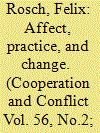

|
|
|
|
|
| Summary/Abstract |
How do practices change? To approach this in practice theory (PT) is a widely debated question. This article brings PT in conversation with the study of emotions in International Relations by considering the role of affect in practice changes. For it is affect that permeates the placiotemporal and bodily constellations during practice performances, continuously provoking changes in and through practices. In initiating this conversation, this article adds to current PT literature by arguing that world political transformations not only find their origin in external conditions, identified as such through individual reflection, but also in affective dynamics of the everyday. To elaborate this more theoretical argument, this article evolves against the empirical backdrop of dancing as an everyday international practice at the Congress of Vienna (1814–1815). Affect that permeated dances in Vienna not only substantiated changes in this practice but, with the waltz replacing the minuet as the preferred dance among international political decision-makers, also changes through it occurred. While the minuet embodied collective sentiments of a transboundary European elite, the waltz helped to further national imaginations of world politics.
|
|
|
|
|
|
|
|
|
|
|
|
|
|
|
|
| 2 |
ID:
125040


|
|
|
|
|
| Publication |
2013.
|
| Summary/Abstract |
Despite its relative absence from much of the literature on politics in the Pacific region, religiosity is an assumed and often unchallenged component of political life. Drawing from more than 100 in-depth biographical interviews with politicians, around 40 published life histories and other publicly available material, this article uses Pierre Bourdieu's concept of 'habitus' to explore how politicians see the role of faith and religious association contributing to their public profile, election campaigning, representative and legislative functions, and 'inner' life. It advances two arguments: firstly, that ideal analytic distinctions like state, society and religion become problematic in the Pacific Islands where political leaders tend to occupy multiple roles and assume overlapping identities; and, secondly, that despite the overwhelming religiosity seemingly apparent in public rhetoric, secularization is an effervescent narrative across the region with politicians vocal protagonists on all sides of this debate.
|
|
|
|
|
|
|
|
|
|
|
|
|
|
|
|
| 3 |
ID:
193299
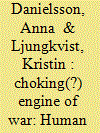

|
|
|
|
|
| Summary/Abstract |
This article explores the question of human agency in military targeting. Targeting is one of the key drivers of war. When studied by academic disciplines, much interest has been devoted to the ethics and effects of military targeting. Less debated, but focused here, is the question of the conditions of human agency within military targeting. In the literature that does exist on this topic, there is a questioning of the traditional conception of human agency but at the same time a lack of closer conceptualisation of different kinds of articulations of human agency in the targeting process. In this article, we propose a recentring of human agency in critical scholarship on military targeting. With inspiration from Theodore Schatzki's work on ‘practice’, by analytically approaching targeting as a practice, and through various examples from Operation Iraqi Freedom, the article develops and illustrates a framework for the conceptualisation of human agencies in targeting. This framework distinguishes articulations of agency based on whether they furthered the (temporary) ordering of the targeting practice or challenged its internal organising elements. The study of military targeting is significant not least since the phenomenon is one of the key ‘engines’ and drivers of war's constant becoming.
|
|
|
|
|
|
|
|
|
|
|
|
|
|
|
|
| 4 |
ID:
140439
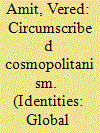

|
|
|
|
|
| Summary/Abstract |
Recent scholarly conceptualisations of cosmopolitanism have often distinguished between mundane practices on the one hand and a conscious assertion of an ethical project on the other hand. But this kind of distinction may be less a matter of the simple presence or absence of a particular kind of consciousness than of the degree of self-awareness as well as of the consonance or disjuncture between this consciousness and what can actually be realised in practice. In this article I take up some of these questions of degree and disjuncture to reflect on the interaction between aspirations and circumscribed experiences occurring among two sets of Canadian travellers: (i) consultants whose specialisation in international projects involves frequent stays abroad, and (ii) young adults who have taken up opportunities for an extended stay abroad afforded by university exchanges or working holidaymakers programs.
|
|
|
|
|
|
|
|
|
|
|
|
|
|
|
|
| 5 |
ID:
169781
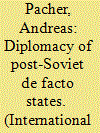

|
|
|
|
|
| Summary/Abstract |
Why do post-Soviet de facto states (such as Abkhazia and South Ossetia) regularly interact with remote Pacific islands or Latin American countries, even though they are not bound by any meaningful political, economic or military ties? This article argues that the diplomatic relationship management amounts to a strategy of external legitimacy-building through stigma rejection and ontological security-attainment. This diplomatic practice creates positively tinged social affiliations, whereby the unrecognized entities aim to have their identity as ‘normal’ states affirmed. It renders the international society’s stigma ineffective, thus facilitating a potential exit from the stigma. By illuminating the performative aspects behind the de facto states’ quest for recognition, this article uncovers the de facto states’ agency and analytically emancipates them from the structural factor of ‘Russia-as-a-great-power’. It also contributes to the literature of ontological security by highlighting how positive (rather than conflictual) relationships, and how transformed (rather than stable) identities can be conducive to its attainment. This article generally highlights the need to analyse de facto states’ foreign relations more holistically than previously done.
|
|
|
|
|
|
|
|
|
|
|
|
|
|
|
|
| 6 |
ID:
182445
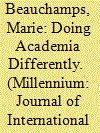

|
|
|
|
|
| Summary/Abstract |
In this article, I explore questions of pedagogy and knowledge-writing practices in their relation to knowledge production. Starting from the observation that different styles of writing are present in our work, but many of them are systematically pushed back and mis-read as non-academic, the article brings to the fore a discussion on the direct relationship between practices of knowledge-writing and those modes of knowing that escape the linear and propositional academic style while still being part of how knowledge comes into being. Following a tradition of intersectional feminist epistemologies, I engage with questions of epistemologies and critical pedagogies, speaking to and with several generations of scholars who address and work with questions of diversity and knowledge production that are seminal within International Relations (IR), yet underexplored from the perspective of knowledge-writing practices.
|
|
|
|
|
|
|
|
|
|
|
|
|
|
|
|
| 7 |
ID:
164283


|
|
|
|
|
| Summary/Abstract |
What does it mean to study security from a critical perspective? This question continues to haunt critical security studies. Conversations about normative stances, political engagement, and the role of critique are mainstays of the discipline. This article argues that these conversations tend to revolve around a too disembodied image of research, where the everyday practice of researchers is sidelined. But researchers do do research: they work materially, socially, and cognitively. They mediate between various feedback loops or fields of critique. In doing so, they actively build and exercise critique. Recognizing that fact, this article resists growing suggestions to abandon critique by, first, returning to the practice of critique through the notion of companionship. This permits us to reinvigorate our attention to the objects, persons, and phenomena through which critique gains inspiration and purpose, and that literally accompany our relationship to critique. Second, we explore what happens when our companions disagree, when critique faces controversies and (a) symmetries. Here, we support research designs of tracing credibility and establishing symmetries in order to move away from critique as denouncing positions we disagree with. Third, we discuss the relation between companionship, critique, reflexivity, and style. Here, the rhetorical practices of critical inquiry are laid out, and possibilities for its articulation in different and less silencing voices are proposed.
|
|
|
|
|
|
|
|
|
|
|
|
|
|
|
|
| 8 |
ID:
148184
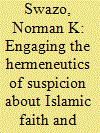

|
|
|
| 9 |
ID:
174571
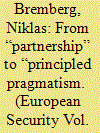

|
|
|
|
|
| Summary/Abstract |
The EU’s relations with countries in the Southern Mediterranean have a long history as the region is of great strategic importance for the Union and its member states. The High Representatives of the Union for Foreign Affairs and Security Policy have been highly involved in shaping these relations, and this role has been officially strengthened with institutional changes brought about with the Lisbon Treaty. This article analyses the role of the HR/VPs in shaping the EU's foreign and security policy towards the region with an analytical focus on discursive practice. Drawing on insights from practice theory in IR and EU studies, the analysis traces continuity and change in how the Southern Mediterranean is described in the drafting of key strategic documents. The main finding is that EU foreign and security policy towards the Southern Mediterranean shows a high degree of continuity despite several crises and institutional changes, although the discursive practices have evolved. The article ends by highlighting a conundrum that the EU can be said to implicitly acknowledge: if authoritarian states in the Southern Mediterranean are inherently unstable, yet stable enough to quench the democratic aspirations of their people, then what should be the basis for EU actions?
|
|
|
|
|
|
|
|
|
|
|
|
|
|
|
|
| 10 |
ID:
070645
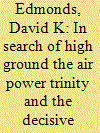

|
|
|
| 11 |
ID:
113856
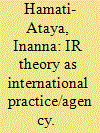

|
|
|
|
|
| Publication |
2012.
|
| Summary/Abstract |
Adopting a reflexive, praxeological understanding of science that rejects the objectivist epistemic antinomy of theory and practice, this article offers two complementary Bourdieusian readings of International Relations theory that specifically aim to conceptualise the structural position of 'periphery' scholars, as well as their extant and potential 'space of possibilities' in the discipline. Grounded in a sociological appraisal of International Relations, the 'clinical' approach objectivates International Relations as a field of international practice wherein the production of theoretical knowledge results from the meeting of different socio-academic habitus and their associated positions with the objective structures of International Relations and the international system. It highlights the relation between International Relations theory and the structural (dis)positions of its authors, the conditions that allow some theories to be objectively possible, meaningful, structuring representations of the world, and the structural constraints imposed on International Relations theorists. The 'cynical' approach suggests how a 'clinical' understanding of International Relations can help marginalised, 'periphery' scholars make sense of their 'space of possibilities' within the discipline, and develop a praxeological, reflexive attitude that could turn them into efficient international agents capable of promoting different scholarly perspectives. More specifically, the article argues that their non-native habitus is a potentially subversive capital - and hence a potential agency of structural change.
|
|
|
|
|
|
|
|
|
|
|
|
|
|
|
|
| 12 |
ID:
153108
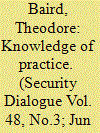

|
|
|
|
|
| Summary/Abstract |
This article takes the reader inside four border security fairs in Europe and North America to examine the knowledge practices of border security professionals. Building on the border security as practice research agenda, the analysis focuses on the production, circulation, and consumption of scarce forms of knowledge. To explore situated knowledge of border security practices, I develop an approach to multi-sited event ethnography to observe and interpret knowledge that may be hard to access at the security fairs. The analysis focuses on mechanisms for disseminating and distributing scarce forms of knowledge, technological materializations of situated knowledge, expressions of transversal knowledge of security problems, how masculinities structure knowledge in gendered ways, and how unease is expressed through imagined futures in order to anticipate emergent solutions to proposed security problems. The article concludes by reflecting on the contradictions at play at fairs and how to address such contradictions through alternative knowledges and practices.
|
|
|
|
|
|
|
|
|
|
|
|
|
|
|
|
| 13 |
ID:
144068
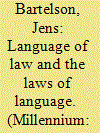

|
|
|
|
|
| Summary/Abstract |
The Status of Law in World Society by Friedrich Kratochwil is a sophisticated attempt to reassert the importance of international law in a globalised world by grounding it in the actual practices of legal reasoning. Yet this attempt to ground normativity in practice strikes me as problematic. As I shall argue, what law is cannot be determined with reference to legal practices only, but will depend on the fulfillment of certain background requirements which themselves stand in need of further justification. Thus the recourse to linguistic practice is beset by an ambivalence that stems from the fact that language and law always already are intertwined, an ambivalence that cannot therefore be overcome with recourse to either. If it is the case that law has a language of its own, we must also be prepared to admit that language has its own laws. What then is gained by the recourse to linguistic practice is not so much a resolution but rather a temporary displacement of indeterminacy from the realm of law to that of language.
|
|
|
|
|
|
|
|
|
|
|
|
|
|
|
|
| 14 |
ID:
145033
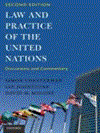

|
|
|
|
|
| Edition |
2nd ed.
|
| Publication |
New Delhi, Oxford University Press, 2016.
|
| Description |
xliii, 741p.pbk
|
| Standard Number |
9780199399499
|
|
|
|
|
|
|
|
|
|
|
|
Copies: C:1/I:0,R:0,Q:0
Circulation
| Accession# | Call# | Current Location | Status | Policy | Location |
| 058661 | 341.23/CHE 058661 | Main | On Shelf | General | |
|
|
|
|
| 15 |
ID:
101367
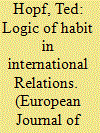

|
|
|
|
|
| Publication |
2010.
|
| Summary/Abstract |
IR theory is dominated by the logics of consequentialism and appropriateness. But Max Weber offered four logics of choice, not just two. Beyond the instrumental rationality of Zweckrationalität and the normative rationality of Wertrationalität are affect and habit. Drawing on Weber, James, Dewey, and Bourdieu, and habit's microfoundations in neurocognitive psychology, I explore the logic of habit and its consequences for several fundamental puzzles in IR theory. The logic of habit necessarily precludes rationality, agency, and uncertainty, and so offers a different interpretation of cooperation, security dilemmas, enduring rivalries, and security communities in international politics. The logic of habit also fills a gap in mainstream constructivism's theorization of intersubjective structures, returning the taken-for-granted lifeworld to the center of attention.
|
|
|
|
|
|
|
|
|
|
|
|
|
|
|
|
| 16 |
ID:
101374
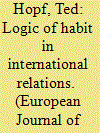

|
|
|
|
|
| Publication |
2010.
|
| Summary/Abstract |
IR theory is dominated by the logics of consequentialism and appropriateness. But Max Weber offered four logics of choice, not just two. Beyond the instrumental rationality of Zweckrationalität and the normative rationality of Wertrationalität are affect and habit. Drawing on Weber, James, Dewey, and Bourdieu, and habit's microfoundations in neurocognitive psychology, I explore the logic of habit and its consequences for several fundamental puzzles in IR theory. The logic of habit necessarily precludes rationality, agency, and uncertainty, and so offers a different interpretation of cooperation, security dilemmas, enduring rivalries, and security communities in international politics. The logic of habit also fills a gap in mainstream constructivism's theorization of intersubjective structures, returning the taken-for-granted lifeworld to the center of attention.
|
|
|
|
|
|
|
|
|
|
|
|
|
|
|
|
| 17 |
ID:
186594
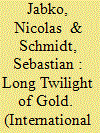

|
|
|
|
|
| Summary/Abstract |
Why has gold persisted as a significant reserve asset despite momentous changes in international monetary relations since the collapse of the classical gold standard? IPE theories have little to say about this question. Conventional accounts of international monetary relations depict a succession of discrete monetary regimes characterized by specific power structures or dominant ideas. To explain the continuous importance of gold, we draw on insights from social psychology and new materialist theories. We argue that international monetary relations should be understood as a complex assemblage of material artifacts, institutions, ideas, and practices. For much of its history, this assemblage revolved around the pivotal practice of referencing money to gold. The centrality of gold as experienced by policymakers had important effects. Using archival and other evidence, we document these effects from the 1944 Bretton Woods conference through the transition to floating exchange rates in the mid-1970s; most IPE scholars underestimate the role of gold during this period. Power relations and economic ideas were obviously important, but they contributed little to a fundamental development: the long process of reluctantly coming to terms with the limitations of specie-backed currency, and the progressive and still ongoing decentering of gold in international monetary relations.
|
|
|
|
|
|
|
|
|
|
|
|
|
|
|
|
| 18 |
ID:
144364
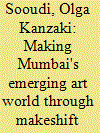

|
|
|
|
|
| Summary/Abstract |
India's art world has garnered significant attention as an ‘emerging art world’, but we know little about how such worlds emerge and are experienced by those working within them. This article explores this question of ‘emergence’ through an ethnography of the Mumbai art world. Gallerists, artists and other insiders generally perceive local conditions as insufficient and in-the-making. They juxtapose Mumbai against idealised, more established art worlds, and engage in creative, improvised ‘makeshift’ practices to remedy the limitations they see. Despite their provisional nature, these makeshift practices produce new spaces, networks and mediators in the Mumbai art world: in other words, art worlds emerge through practice.
|
|
|
|
|
|
|
|
|
|
|
|
|
|
|
|
| 19 |
ID:
148314
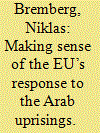

|
|
|
|
|
| Summary/Abstract |
The Arab uprisings of 2011 put into question previously held understandings about the stability of authoritarian regimes in North Africa as well as the European Union’s (EU’s) relations with countries in its southern neighbourhood. Despite early calls on behalf of the EU to change its policies, the Union’s responses in the early stages seemed mostly characterised by continuity. This article claims that certain dispositions and background knowledge developed over several decades vis-à-vis EU’s Mediterranean policies served as a baseline from which EU officials and diplomats acted. Drawing on insights from practice approaches, the article argues that the practical understandings on what the EU can (and cannot) do vis-à-vis partner countries in North Africa create a kind of power politics of practical dispositions. The article focuses on the European Neighbourhood Policy - the EU’s flagship initiative - and builds on a unique set of data that combine policy documents and interviews with about 30 EU officials and national diplomats from before and after the Arab uprisings. In this way, it illustrates how practice relates to change in that even though the EU’s responses drew on an established repertoire of practice, enacting it in a new context opened up new possibilities for action.
|
|
|
|
|
|
|
|
|
|
|
|
|
|
|
|
| 20 |
ID:
140438


|
|
|
|
|
| Summary/Abstract |
Within the interdisciplinary literature on cosmopolitanism, one particularly important distinction stands out as a recurring motif. Specifically, scholars have been concerned to distinguish between cosmopolitanism as a set of mundane practices and/or competences on the one hand and cosmopolitanism as a cultivated form of consciousness or moral aspiration on the other. For anthropologists, this distinction between aspiration and practice is often rendered ambiguous across the diverse expressions of cosmopolitanism that they encounter ‘on the ground’. This special issue therefore brings together five contributions from anthropologists who are reporting on encounters and aspirations that reveal different forms of spatial mobility, scales of commitment or risk, and are often transient, ambivalent and precarious. These are circumstances in which cosmopolitanism emerges as uneven and partial rather than as a comprehensive or unequivocal transformation of practice and outlook.
|
|
|
|
|
|
|
|
|
|
|
|
|
|
|
|
|
|
|
|
|